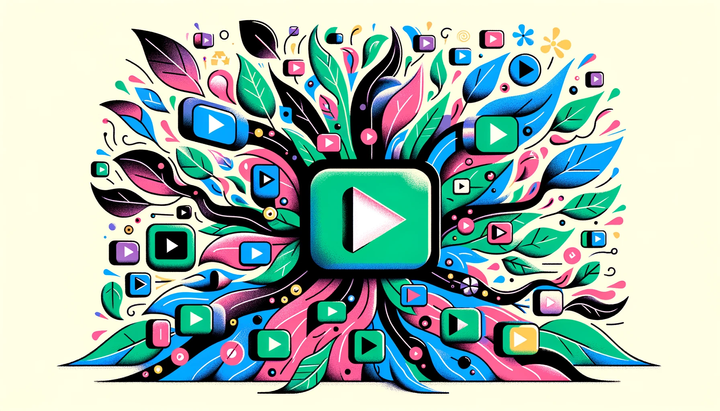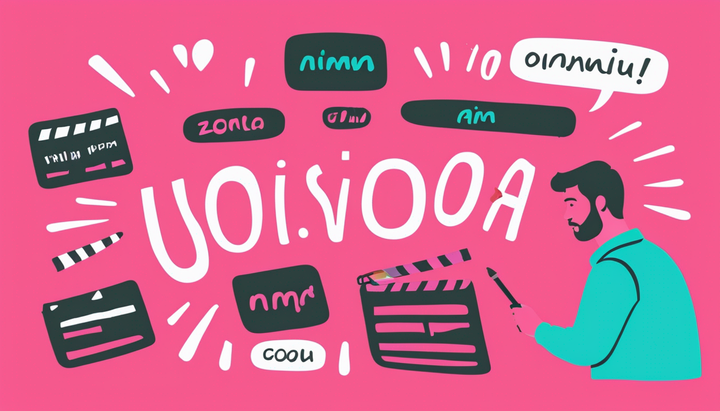What Role Will Creators Play in the Future of B2B Marketing?
A decade ago, the "creator" was synonymous with influencer. Now, every desk worker is in some ways a creator. Here's my prediction on how the "Creator GTM" and how it impacts B2B marketing strategy

Everywhere content marketers go to chat and exchange ideas, there's one big topic being discussed now: What role will creators play in the future of B2B content marketing?
The answer is both nuanced—and uncertain! At Kapwing, we believe B2B brands will start to use creators in their go-to-market approach more often and in potentially unexpected ways. We'd call the sum total of these efforts Creator Go-to-Market, or Creator GTM. And today, we're going to explore where we see things headed.
What is Creator Go-to-Market?
"Creator Go to Market (GTM)" is an approach to B2B marketing that builds awareness and acquires customers by publishing interesting and useful content via an individual creator.
That sounds awfully similar to content marketing, but the main difference between Creator GTM and traditional brand content marketing is the "creator," or individual personality, is at the center of the content and influences everything about it. Creators infuse their content with their own lived experiences and opinions and, importantly, become part of the draw of the content itself.
What Creator GTM actually looks like is less clear and, in many ways, is still being determined. The bread-and-butter sponsored post from an industry influencer is part of the mix, as is the marketing team supporting a founder or exec with their social media presence. But then there are brand-created shows that hire creators as hosts, or employee evangelists who grow faster on social media than the company's own brand accounts.
In truth, it's messy and mostly up to your company to define—similar to content marketing itself. Before we all collectively figure out how we're going to use creators in the future, it's helpful to take a step back and dig into what is driving this discussion, excitement, and potential shift in marketing.
What's drawing B2B brands toward creators?
Just like many other content marketing trends we've covered, there's actually an overlapping set of changes happening that's causing brands to look at creators as a future opportunity. As usual, it's rarely just one thing.
1. The growing influence of creators
Marketing connects customers to products. Strip away the frills and that's what it comes down to. In order for marketers to do this successfully, they have to go where customers are; that means that any meaningful shift in where and how people spend attention drags along a shift in marketing priorities in its wake.
What's changing right now for consumers is how much time and attention they're giving creators. The reach and influence of creators have significantly increased relative to when the "creator economy" didn't even have a name. In the most extreme examples, like MrBeast, creators end up being bigger and more influential than full-scale media outlets with a single personality at the center.
This isn't changing anytime soon. If you asked me who my favorite "creators" were in 2010, I probably couldn't name one. Today I can list multiple for each of my various interests. If there's an activity people want to get better at, there is someone creating content on the internet for it.
2. Rise of professional or "B2B" creators
Speaking of, it was only a matter of time before creators focused on career advice/professional work began to take hold. In reality, work-focused creators have been here all along in the form of early bloggers, but the space was eventually eaten up by companies embracing inbound marketing and creating their own content for customers.
Work-focused creators are a symptom of a simple truth: people want to get more out of their careers, and they trust the lived experience of a person over a faceless brand. A person can tell you about the mistakes and scar tissue they've earned, they can recount stories from their career, and they can share points of view based on their unique experience.
And while individuals can certainly shine through via company-created content, it's far easier to discover and connect with specific people you like and enjoy learning from when they're not just creating the content, but serving as the face for it. Oh, and let's not forget: work-focused creators aren't encumbered by OKRs or the Legal team—making them the ideal outlet for "real talk" about your discipline.
3. Traditional content marketing needs to evolve
Content marketing felt like it was squeezed on all sides this year, with more uncertainty along the way. CAC for content marketing is way up from the early days, tried-and-true channels like search and email have become increasingly more crowded, and every social platform is now allergic to any links sending people back to your website.
All of that makes present-day content harder, but then there's the current and future potential of AI. We're very optimistic about the latter, and our data says video creators are embracing AI too. But that doesn't mean there won't be bumps in the road as the industry gets adjusted to the firehose of AI created content and the expectations and changes it brings.
It feels like the end of an old era and the start of the new one. No surprise, content marketers are very keen to see how the next chapter unfolds from here. From our discussions, most people are placing their bets on personality-driven content in new and engaging formats that's distributed to where people already spend their time—it's easy to see where creators fit in.
4 beliefs about how Creator GTM develops
What's fun about industry shifts is that you're able to place your bets on where things head and potentially gain an edge (or avoid wasting time) if you're right.
We're figuring out how this potential shift plays out for Kapwing, too, and what should change about our marketing in response. Given what we've seen so far, here are four beliefs we have about how creators will end up influencing B2B marketing:
1. Creator GTM is in-house and external
At a distance, Creator GTM might just come across as traditional influencer marketing. What that looked like was a creator serving almost as a billboard for their most recent brand sponsorship—sometimes going no further than a single post.
But Creator GTM looks more like a deep integration of creators into your marketing. That means involving external creators in a more substantial way, such as co-producing a show or series of content with them. And it also means embracing in-house creators in your company; the natural talent and the figureheads who may need some support.
The reason is that in-house and external creators play different roles and create separate kinds of value for most companies. External creators are great for distributing broader brand campaigns and kickstarting awareness with a certain audience or ICP; internal creators are better-suited for sharing your company's point of view.
If you want to truly unlock creators as a channel, you'll likely need both.
2. Creator GTM doesn't mean everyone becomes an influencer
Fascinating story I was just told.
— Alex Lieberman (@businessbarista) December 4, 2023
One of the largest companies in the world is all-in on personal brand.
It has a team that trains every single employee from the most junior to the CEO on building audience online.
I believe every company will operate in this way 5 years…
One popular belief that's emerged from brands' forays into Creator GTM is that, somehow, this will all lead to companies filled with employee influencers. That doesn't seem likely.
Most companies don't even train people for the jobs they have, let alone "influencing." And if you've ever spun up a program that tries to put the individual at the heart of the content, you know about the pushback around risk and brand safety. That's to say nothing of just how difficult it must be to roll out some sort of training for content creation at scale.
Most people do not make for good content creators. The far more likely scenario for in-house creators is a focus on a few key groups:
- Hired talent. People who already have experience building audiences through e.g. past roles or side projects are naturally going to be at the top of the list for those most likely to succeed as in-house creators. Creators will be hired specifically for this purpose; think of it like hiring an in-house YouTuber or columnist.
- Founders and execs. Startups in particular benefit from Creator GTM because they typically have the most flexibility in turning their leaders into creators—they also have the most to gain. Co-founders or execs are great creators for your company because they're often the best vehicle to deliver your company's strongest points of view.
- Cherry-picked subject matter experts. Last but not least are the people within your company who really know your industry and customers and who have the talent and desire to take on evangelist-style responsibilities, with some support. Surfacing internal SMEs like this is especially useful when you have a somewhat complicated or specialty product, or if you sell into a particular role.
We started our approach by supporting our CEO, Julia, with her presence on LinkedIn. And since our product is widely used by content teams, our head of content (👋) also publishes daily on LinkedIn. The role the marketing team plays right now is to support these in-house creators with batch recordings, edits, and scheduling.
Belief #3: The hurdles aren't being discussed as much as the opportunity
We are seemingly in the honeymoon phase of Creator GTM—and maybe even earlier than that. Predictions are where things go from here are hazy, but feel naively optimistic. As much as we also believe creators will fundamentally shift how teams do marketing, there are some truths to acknowledge:
Creator GTM is extremely hard to pull off
Plenty of companies don't even get traditional organic content marketing to create meaningful impact, let alone the much more complicated and difficult task of building a content strategy around individuals. This isn't about fit either—many companies just fail to do it well.
Creator GTM will likely have an even greater failure rate than content marketing overall. The planning, execution, and managing of a people-first approach to content is going to be much harder than the legacy play of publishing everything in the brand voice and on brand accounts. The good news: the greater the hurdle, the less competition you'll face if you make it over.
Creator GTM comes with real risks
Creator GTM feels like an iceberg right now—while some potential risks are known, many can only be assumed or imagined until more companies face them. Here's just a few to consider:
- If you invest in an in-house creator and they're very successful, what happens if they leave and take their audience with them?
- What if an external creator you've partnered with says something unexpected or unseemly on their personal channels?
- What if an employee, e.g. a Sales Rep, has become a great evangelist through their own posts, but is terrible at their actual job?
- What if a prominent creator you work with ends up accepting sponsorships for competitors, either outside their day job or after their contract ends?
- Who gets rights to all of the content/IP created after an engagement with a creator ends? What about if it's an in-house creator?
There are plenty of questions and comparatively few answers; a sign of how early we are into this development. But companies who pursue Creator GTM in earnest should expect to roll up their sleeves and deal with these more challenging questions as they arise, and do so without much of an established playbook.
Creator GTM won't work for everyone
Given that Creator GTM requires a much bigger commitment than a sponsored influencer post, it's going to end up as an approach that just won't work for every brand. Either the brand will struggle to figure things out, or all of the time spent wrangling a creator strategy would have ended up better spent on more traditional forms of marketing.
This is especially true in B2B, where there are far fewer "celebrity" creators to tap. That will require more of a mixed approach with in-house creators and close partnerships with niche external creators; a program that is not simple or easy to manage. Overall, Creator GTM will likely produce outsized results for the right brands, and middling success with the wrong ones.
Belief #4: Creator GTM will mostly be driven by marketers
Here's a straightforward one: We expect marketing teams—and particularly content teams—to play a leading role in Creator GTM. Not only in building the strategy, managing the creator relationships, and planning the content, but also in being some of the most visible creators. In fact, Marketing, Sales, and Community teams should expect this to become part of some job descriptions.
That may seem obvious, but right now it's not exactly clear where a creator-driven approach will be led from. There's sure to be lots of collaboration, even within marketing, but we strongly believe that marketing will (and should) take the reins for driving creator programs forward. And if they're going to lead, they need to be hands on too, which is where content managers can step up and bring their existing expertise into this new way to approach organic growth.
Creators 🤝 Marketing
While Creator GTM is often pitched as this wholly new way to do marketing, we see it more as an evolution. The internet allowed us to connect globally, then social media allowed us to connect more personally. People like learning from people, and so it was only natural for attention to shift away from faceless brands and toward other users; some of these users took creating content for the internet seriously, and they became "creators" and ended up commanding lots of attention.
Marketers eventually caught on. Wherever attention goes, marketers follow. And with creators commanding so much attention these days—in every industry and interest—it's worth asking yourself how your approach to marketing should change as a result.
Create content faster with Kapwing's online video editor →








